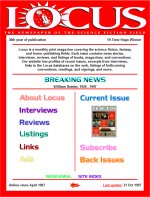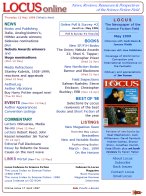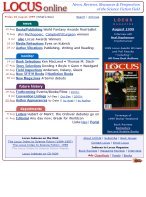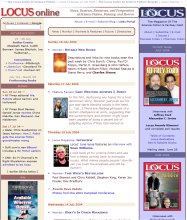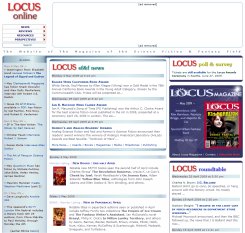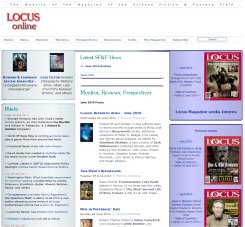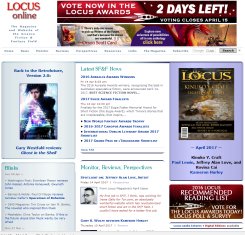The Website of The Magazine of the Science Fiction & Fantasy Field
 |

|
|
The Website
|
20 Years of Locus Online
Introduction
Twenty years ago, already working for Locus as the magazine's monthly short-fiction reviewer since 1988, I volunteered to Charles N. Brown to set up a Locus website. It was the early days of the web and it was becoming fashionable, even necessary, for any kind of institution or publication to have an online presence. Not coincidentally, I volunteered for a similar task at my workplace, an engineering firm that built the Space Shuttle Main Engines among other things, to create an internal website for my department, and so was able to learn HTML on company time and then apply it in my spare time to building a Locus site. (In the following years I used a similar tactic to learn how to build databases in Microsoft Access, and then to generate webpages from them, which led to my SF awards sites.) From the beginning this site's mission has been to post samples of content from Locus Magazine, as enticements to attract new subscribers, and to post supplemental material special to the site, as bonuses for regular readers. I also recognized early on that there were three principal ways websites have advantages over print publications: they can post content in a timely manner and update continuously (rather than publishing periodic 'issues'); they can accumulate content (like indexes) on static pages without having to issue periodic print volume updates; and they can link to other sites and posts on other sites to allow access to information without posting such information themselves. I think the site has successfully exploited all three advantages, over the past two decades. Here's a timeline of significant developments, and featured posts, over those 20 years. Note that any posts older than 2009 display earlier designs of the site (and early pages were very narrow by current standards!). Below the featured posts is a gallery of homepage captures, showing the development of the site's design since the beginning.
--Mark R. Kelly Timeline 1997
1999
2000
2001
2002
2003
2004
2005
2006
Selected posts by Locus Online's contributors Gary Westfahl, commentaries and film reviews since 2001: 1 July 2001 (his first review for Locus Online): Me, Robot: A Review of A.I.The best sorts of science fiction raise difficult questions about science and humanity's future and attempt to wrestle with those questions as best they can. Steven Spielberg's previous science fiction films, I have argued elsewhere, vigorously avoid difficult questions in an effort to please the crowd and make people feel good about themselves. A.I. may qualify as Spielberg's best science fiction film simply because it does raise difficult questions ...6 March 2011: Philip K., Diminished: A Review of The Adjustment Bureau The operatives of Hollywood’s Adjustment Bureau had gathered to map out strategies for their latest assignment: given this quirky little story by Philip K. Dick, “Adjustment Team” (1954), how could they “adjust” its plot to transform it into a crowd-pleasing blockbuster?23 Feb 2009: Pitfalls of Prophecy: Why Science Fiction So Often Fails to Predict the Future As a person regarded in some circles as an expert on science fiction, I was once asked to give a presentation offering some predictions about the future; science fiction writers routinely face the same request.6 March 2006: Homo aspergerus: Evolution Stumbles Forward As publicity about the condition has increased in recent years, I have gradually come to the conclusion that I have suffered all my life from an undiagnosed case of Asperger's Syndrome — although, as will be explained, I don't think that "suffered" is the proper term. Paul Di Filippo, book reviews since 2012: 22 Apr 2012: review of Samuel R. Delany's Through the Valley of the Nest of SpidersSamuel R. “Chip” Delany wants to push your buttons—I mean that in a good way—and really knows how to do so in the most esthetically magnificent, narratologically adroit, intellectually rich, and filthily transgressive fashion.7 Oct 2016: review of Ursula K. Le Guin's The Found and the Lost: The Collected Novellas of Ursula K. Le Guin How can a reviewer possibly say something fresh and illuminating about a writer of Ursula K. Le Guin’s immense stature, at this epochal moment in her career? Lawrence Person & Howard Waldrop, film reviews: Lawrence Person only: 10 Apr 2003: Donnie Darko: The DVDBut it is one of the most original, complex, and interesting SF films to come out of Hollywood in a long time, and it may very well be the most overlooked SF film of the last decade.Lawrence Person & Howard Waldrop: 23 Oct 2006: Movie Review of The Prestige Both: All year we've been complaining about the movies we've been reviewing here. We told you we'd let you know when Locus finally sent us to a good film. And now, in recompense for our suffering, we get to review The Prestige. But in a way we're still waiting, because The Prestige is not a good film.Lawrence Person & Howard Waldrop: 8 Nov 2004: The Incredibles The question isn't whether it's going to win the Oscar for Best Animated Film, the question is whether it will win the Oscar for Best Film. We fully expect it to be nominated; it's that good. First, you forget you're watching a Pixar movie. Then, you forget you're watching a movie... Lois Tilton, short fiction reviews: Lois Tilton reviews Short Fiction: early November 2015This time I feature a science fiction anthology and recommend the John Barnes story as one of the year’s best. Also a couple of first-of-the-month publications.Lois Tilton reviews Short Fiction, mid-August Featuring a really fine issue of F&SF, with the Good Story Award to Andy Duncan. The current issue of Shimmer is also particularly worth reading. Among Many Others...
Selected April 1st posts Inspired by a patio conversation with Charles N. Brown and others at ICFA, the International Conference on the Fantastic in the Arts held every year in Florida, in 2000, Locus Online posted April 1st humor pieces for many years, usually using anagrammed versions of their contributors' names.
Selected Roundtable posts:
Gallery Here is a selection of homepage captures from the past two decades, as the design of Locus Online has changed, reflecting the changes in design standards across the web: e.g. as screen resolutions increased, sites got wider; layouts settled on reverse-chronological order of new posts; page designs became unified through stylesheets; graphics became more important. Over the years I looked to professional sites like CNN and Slate for design cues. For the first decade every page on the site was composed manually. In 2008 we began using first Blogger, and then Wordpress, to host portions of the site, beginning with the News, though the homepage is still edited manually, in part, to this day.The earliest homepage used basic HTML tables with resizeable color graphics to mimic the front cover of the magazine, which in 1997 always had a big red border (like Time Magazine); the width was 600 pixels. By 1999 the site established its own logo (font: Souvienne), subtitle ("News, Reviews..."), and a three-column layout with colored headers, rather cluttered text, and surrounded by a thin curved-corner border, at just 585 pixels wide. Within a few months this was cleaned up a bit with a single main section separate by tab-like colored headers. (Length of screen captures varies depending on content at the time.) The first expansion of the site, to 750 pixels wide, came in 2001, allowing a left sidebar for cumulative links. This is what the site looked like in the year for which it won the Hugo Award. By 2004 the homepage went to a strict, reverse-chronological order for main posts down the center. A new tiny spaceship icon was placed at the bottom right. Then by 2005 the width crept out to 800 pixels, drop-down menus were established along the top, and the colors changed from the tan and lavender scheme to the blue/green and lavendar scheme similar to what's still in use. In 2008 the width jumped to the current 980 pixels, allowing for the logo, and two standard-sized banner ads, across the top. In December 2008 the Locus Magazine staff took over the posting of news on the site, via Blogger, and the homepage was rearranged to highlight the latest news posts in a box at the top of the central column. (While a different set of drop-down menus was located below the logo in upper left.) In this May 2009 capture, the banner ads have been removed. In 2009 and 2010 the News blog migrated from Blogger to Wordpress, and the other main sections of the site -- Reviews, Monitor, Perspectives -- were set up in matching blogs. (The manually created design of the homepage was applied to the Wordpress blogs, with appropriate variations; no pre-designed Wordpress templates have ever been used.) By June 2010 the current homepage design was established, with gradiant colors behind both left and right sidebars, thinner end-caps and separators, the main central column reduced so that all three sections are of roughly equal width, and a new set of horizontal drop-down menu bars. And here's the homepage as it looked on April 14, 2017.
The website will keep changing: look for a redesign and total unification of the site into a single platform sometime in the next year.
|
|
|
|
| © 2017 by Locus Publications. All rights reserved. |
